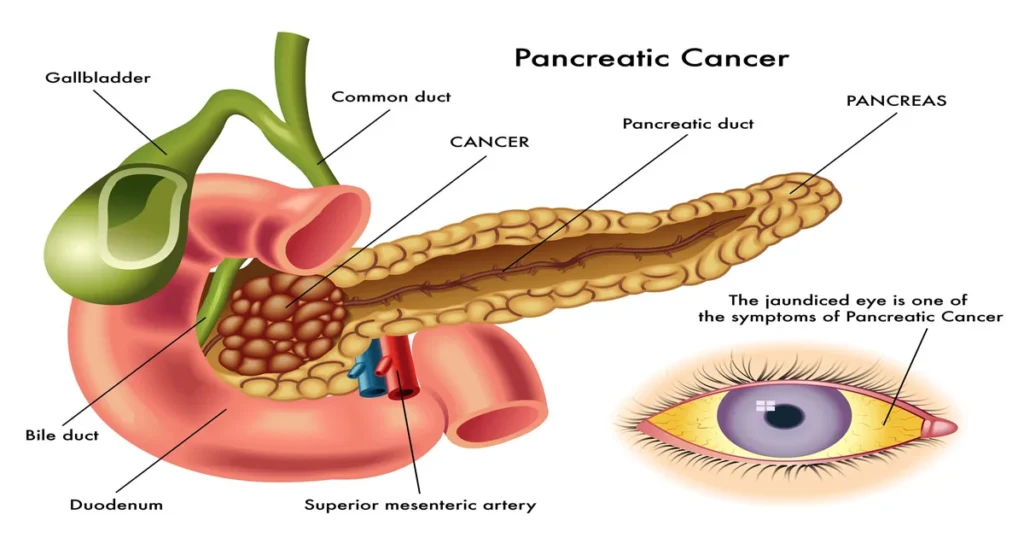Introduction
Pancreatic cancer is a malignant disease that affects the pancreas, an important organ responsible for producing digestive enzymes and hormones such as insulin. It is a highly aggressive form of cancer with a low survival rate. In this article, we will delve into the causes, symptoms, and treatment options for pancreatic.
Read More: Spindle Cell Sarcoma

Understanding Pancreatic Cancer
Pancreatic cancer occurs when abnormal cells in the pancreas grow uncontrollably, forming a tumor. This malignant tumor can interfere with the normal functioning of the pancreas and spread to other parts of the body if left untreated. It is crucial to understand the risk factors associated with pancreatic to ensure early detection and effective treatment.
Risk Factors
Several factors contribute to the development of cancer, including:
- Age: The risk increases with age, with the majority of cases occurring in individuals over 65 years old.
- Smoking: Cigarette smoking is a significant risk factor for pancreatic .
- Family History: A family history of cancer or certain genetic syndromes can increase the risk.
- Obesity: Being overweight or obese is associated with a higher risk of developing cancer.
- Diabetes: Chronic diabetes may increase the likelihood of pancreatic .
- Chronic Pancreatitis: Inflammation of the pancreas over a long period can increase the risk.
Signs and Symptoms
Pancreatic cancer often shows vague or nonspecific symptoms, making it challenging to diagnose in its early stages. Some common signs and symptoms include:
- Abdominal pain: Pain in the upper abdomen or back.
- Jaundice: Yellowing of the skin and eyes.
- Unexplained weight loss: Significant weight loss without a known cause.
- Loss of appetite: A decreased desire to eat.
- Digestive problems: Nausea, vomiting, and changes in bowel movements.
- New-onset diabetes: Diabetes that develops suddenly and without an obvious cause.
Diagnosis and Staging
To diagnose pancreatic cancer, various tests and procedures may be conducted, including:
- Imaging tests: CT scans, MRI, and ultrasound can help visualize the pancreas and detect any abnormalities.
- Biopsy: A sample of pancreatic tissue is obtained for examination under a microscope to determine if cancer is present.
- Staging: The extent of the cancer is determined to guide treatment decisions.
Types of Pancreatic Cancer
Pancreatic cancer can be classified into two main types:
- Exocrine Tumors: The most common type, accounting for about 95% of cases. They originate in the cells that produce digestive enzymes.
- Endocrine Tumors: Also known as neuroendocrine tumors, they develop in the hormone-producing cells of the pancreas.
Treatment Options
The treatment of pancreatic cancer depends on various factors such as the stage of cancer, location, and overall health of the patient. The primary treatment modalities include:
1. Surgery
Surgical intervention aims to remove the cancerous tissue and may involve procedures such as:
- Whipple Procedure: Removes the head of the pancreas, part of the small intestine, gallbladder, and bile ducts.
- Distal Pancreatectomy: Removes the body and tail of the pancreas.
- Total Pancreatectomy: Removes the entire pancreas.
2. Chemotherapy
Chemotherapy uses drugs to kill cancer cells and can be administered before or after surgery. It may also be the primary treatment option for advanced cases where surgery is not possible.
3. Radiation Therapy
Radiation therapy utilizes high-energy beams to destroy cancer cells. It is often combined with other treatments to improve outcomes.
4. Targeted Therapy
Targeted therapy drugs work by targeting specific abnormalities in cancer cells, interfering with their growth and survival.
5. Immunotherapy

Immunotherapy boosts the body’s immune system to recognize and attack cancer cells effectively.
6. Clinical Trials
Clinical trials provide access to experimental treatments and therapies not yet widely available. Participation in clinical trials contributes to the advancement of cancer research.
Coping with Pancreatic Cancer
A pancreatic diagnosis can be overwhelming. It is essential to focus on physical, emotional, and psychological well-being during the treatment process. Coping strategies include:
- Seeking support: Engage with support groups, counselors, or therapists who specialize in cancer care.
- Maintaining a healthy lifestyle: Eat a balanced diet, exercise regularly, and get enough rest.
- Exploring complementary therapies: Complementary therapies such as acupuncture or massage may help alleviate symptoms and promote relaxation.
Supportive Care
Supportive care aims to manage the symptoms and side effects of pancreatic cancer treatment. It may include pain management, nutritional support, and palliative care to enhance the patient’s quality of life.
Prevention and Early Detection
While there is no guaranteed way to prevent pancreatic cancer, certain measures can reduce the risk:
- Quit smoking: If you smoke, quitting can significantly reduce the risk of developing cancer.
- Maintain a healthy weight: Follow a balanced diet and engage in regular physical activity to maintain a healthy weight.
- Limit alcohol consumption: Excessive alcohol consumption may increase the risk of pancreatic .
- Get regular check-ups: Routine check-ups and screenings can help detect pancreatic in its early stages.
Conclusion
Pancreatic is a formidable disease that requires early detection and effective treatment for improved outcomes. Understanding the risk factors, signs and symptoms, and available treatment options is crucial. By adopting a proactive approach to prevention and maintaining a healthy lifestyle, we can reduce the risk and make progress in fighting this devastating disease.
Read More: Pancreatic Cancer
FAQs

1. How common is pancreatic cancer?
Pancreatic cancer is relatively rare, accounting for about 3% of all cancers in the United States.
2. What is the survival rate for pancreatic cancer?
The survival rate for pancreatic cancer is low, with only around 10% of patients surviving five years after diagnosis.
3. Can pancreatic cancer be inherited?
While most cases of pancreatic are not inherited, certain genetic syndromes can increase the risk.
4. Are there alternative treatments for pancreatic cancer?
Clinical trials offer access to alternative treatments and therapies that are being researched for pancreatic cancer.
5. How can I support someone with pancreatic cancer?
Offer emotional support, accompany them to medical appointments, and help with practical tasks to support someone with cancer.






